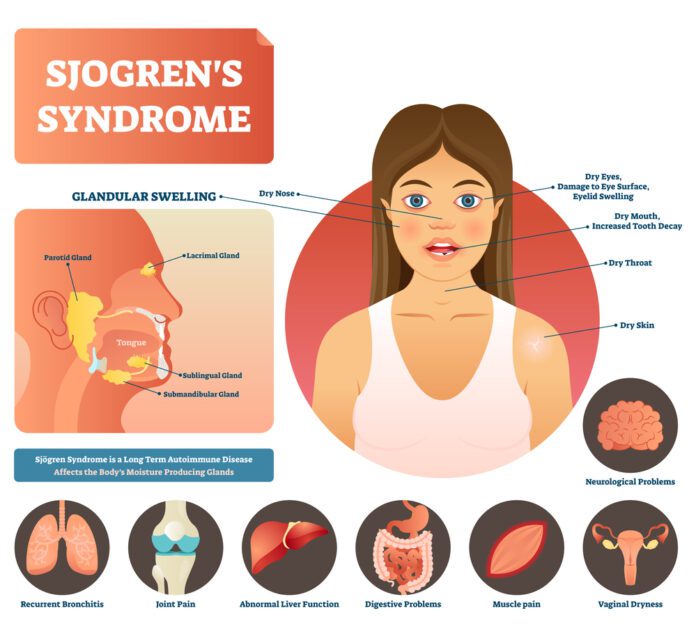Overview Of Sjogren’s Syndrome
Sjogren’s Syndrome is an autoimmune disease that affects the glands which produce tears and saliva are then destroyed. This will inevitably cause dry mouths and dry eyes. The condition may affect other parts of the body, as well, including the kidneys and lungs.
Commonly Associated With
Xerostomia – Sjögren syndrome; Keratoconjunctivitis sicca – Sjögren; Sicca syndrome
Causes Of Sjogren’s Syndrome
The exact cause of Sjögren syndrome is not clear. However, it is an autoimmune disorder, which means the body attacks healthy tissue by mistake, where in this case it is the specific glands that produce tears and saliva. The syndrome also develops most frequently in women ages 40 to 50. It is rare in children.
Additionally, primary Sjögren syndrome is defined as dry eyes and dry mouth without another autoimmune disorder.
Secondary Sjögren syndrome can develop along another autoimmune disorder, such as:
- Rheumatoid arthritis (RA)
- Systemic lupus erythematosus
- Scleroderma
- Polymyositis
- Hepatitis C can affect the salivary glands and looks like Sjögren syndrome
- IgG4 disease can look like Sjogren syndrome and should be considered
Symptoms Of Sjogren’s Syndrome
Dry eyes and dry mouth are the most common symptoms of this condition.
Eye symptoms:
- Itching eyes
- Feeling that something is in the eye
Mouth and throat symptoms:
- Difficulty swallowing or eating dry foods
- Loss of sense of taste
- Problems speaking
- Thick or stringy saliva
- Mouth sores or pain
- Teeth decay and gum inflammation
- Hoarseness
Other symptoms of sjogren’s syndrome may include:
- Fatigue
- Fever
- Change in the color of hands or feet with cold exposure (Raynaud phenomenon)
- Joint pain or joint swelling
- Swollen glands
- Skin rash
- Numbness and pain due to neuropathy
- Cough and shortness of breath due to lung disease
- Irregular heartbeat
- Nausea and heartburn
- Vaginal dryness or painful urination
Exams & Tests
A complete physical exam is necessary to determine if a person has this condition. An exam then tends to reveals dry eyes and a dry mouth. There may also be mouth sores, decayed teeth, or gum inflammation; and this will then occur because of mouth dryness. A healthcare provider will examine the mouth for potential fungal infection. Additionally, the skin can show a rash, a lung exam may be abnormal, or the abdomen will be palpated for liver enlargement. The joints can also be examined for arthritis. The neuro exam will look for deficits.
You may have the following tests done:
- Complete blood chemistry with liver enzymes
- Complete blood count with differential
- Urinalysis
- Antinuclear antibodies (ANA) test
- Anti-Ro/SSA and anti-La/SSB antibodies
- Rheumatoid factor
- Test for cryoglobulins
- Complement levels
- Protein electrophoresis
- Test for hepatitis C and HIV (if at risk)
- Thyroid tests
- Schirmer test of tear production
- Imaging of the salivary gland: by ultrasound or by MRI
- Salivary gland biopsy
- Skin biopsy if a rash is present
- Examination of the eyes by an ophthalmologist
- Chest x-ray
Treatment Of Sjogren’s Syndrome
The general treatment goal is to then relieve symptoms.
Dry eyes may be treated with artificial tears, eye-lubricating ointments, or cyclosporine liquid.
If an infection is present, it could then potentially be treated with sugar-free miconazole or nystatin preparations.
Tiny plugs can also be placed in the tear drainage ducts to help tears stay on the surface of the eye, keeping it moisterized.
Disease-modifying antirheumatic drugs (DMARDs) similar to those used for RA can improve symptoms of Sjögren syndrome, though. However, these include tumor necrosis factor (TNF) inhibiting drugs such as Enbrel, Humira or Remicaide.
Some things you can do to potentially ease symptoms include:
- Sip water throughout the day
- Chew sugarless gum
- Avoid medicines that can cause mouth dryness, such as antihistamines and decongestants
- Avoid alcohol
Talk with your dentist about:
- Mouth rinses to replace minerals in your teeth
- Saliva substitutes
- Drugs that help your salivary glands make more saliva
To prevent dental decay caused by mouth dryness:
- Brush and floss your teeth often
- Visit the dentist for regular checkups and cleanings



